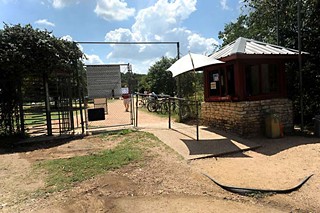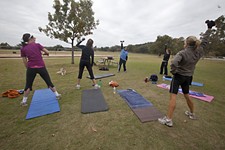Then There's This: Parks and Rec in Review
In a parks-centric town like Austin, it's not easy being PARD
By Amy Smith, Fri., Dec. 28, 2012
What a mad, mad, mad, and maddening year it's been for the Austin Parks and Recreation Department and the people it peeved in 2012. Name a constituency, and PARD has riled it in some way.
Hike and bike trail runners? Check. Flower club ladies? Check. Swimmers? Check. Youth hostel supporters? Check. Parks advocates? Check, check, check.
Clearly, Parks and Rec wasn't the only city department to come under public fire this year – Austin Energy, the water utility, and the police department more readily come to mind. But what sets PARD apart from the heavy hitters is that people's expressed love of parks far outweighs the budget to run and operate the city's 16,000-plus acres. What's a department with a perennially skimpy budget to do?
Financial stresses can lead to bad decisions and half-baked "repurposing" ideas that, more often than not, tend to favor private entities more than the taxpayers footing the bill. That's not to say public-private deals can't be successful, but transparency can go a long way in building trust with a community that has grown skeptical of PARD's mission to make parks pay for themselves. If only city leaders were as hellbent on making billion-dollar corporations pay for themselves.
Madcap Moments
Fresh from retreating on controversial plans in 2011 to privatize the Dottie Jordan and Austin Recreation Centers, PARD again found itself in hot water at the start of 2012 over a plan that would have allowed the YMCA to build an aquatics center on prime city-owned property along the north shore of Lady Bird Lake.
The proposal would have asked voters to approve $25 million in bond money to build the facility. The idea, which, remarkably, was allowed to mature with very little public knowledge, sparked a public outcry, leading PARD and high-level city officials to scrap the plan. But don't think (for even a minute!) that that's the last we've heard about developing the property, which also includes the site of the formerly city-run Town Lake Animal Center, currently occupied by Austin Pets Alive!
The dust had barely settled on the Y disturbance when another controversy emerged – this one over PARD's decision to end its lease contract with the Austin franchise of Hostelling International in 2013. The affordable hostel for young travelers has long occupied a piece of parkland on South Lakeshore Boulevard. The threat of terminating the lease set off alarm bells around town, and PARD Director Sara Hensley found herself having to defend her actions before City Council. With Council's intervention, the hostel was instead granted a 10-year lease, and PARD was simultaneously stripped of some of its administrative authority.
The merry month of May heralded another firestorm – this one over PARD soliciting proposals from private companies to operate Zilker Botanical Garden – 30 acres of heaven on Earth just north of Zilker Park. Garden clubs across town went ballistic – understandable in view of the number of hours club members spend volunteering at the center, which also serves as a meeting space for many of the groups. With the outpouring of negative responses, parks officials shelved the plan. But wait – the influential Austin Parks Foundation, a volunteer parks-improvement group, supports the privatization plan, so it's possible the proposal could rebound in some fashion.
The spring and summer saw momentum step up from out of the blue for the proposed redo, or gentrification, of the rough-hewn and unpretentious south side of Barton Springs Pool. The proposal goes to Council for final approval in the New Year, with two camps of regular swimmers at odds over the proposed makeover, which has turned into a very emotional affair.
In October, concerns that PARD was dabbling with the idea of selling naming rights for parks prompted Council to consider tightening its rules to discourage naming parks after the highest bidder without first considering the donor's community contributions and allowing for a thorough public vetting.
And in late November, joggers and walkers on the Lady Bird Lake hike and bike trail noticed the absence of water jugs that have provided cool relief for thirsty trail users – a free service that RunTex has provided for at least 20 years. But Parks officials ordered the removal of the jugs out of a sudden concern for public safety. They say a health permit is needed to continue the tradition.
What's in store for Parks and Rec in 2013? It's hard to say, but at this point it looks like more of the same.
Got something to say on the subject? Send a letter to the editor.













